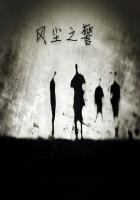The windows were curtained with snow, that increased the general gloom, though some of the layers shone ghostly white and crystalline, in the light of the forge, and of two little grates he had set in a monument.
Two heaps of snow lay in the center aisle, just under two open places in the roof, and, on these, flakes as big as a pennypiece kept falling through the air, and glittered like diamonds as they passed through the weird light of the white coals.
Oh! it was an appalling place, that night; youth and life seemed intruders. Henry found it more than he could bear. He took a couple of candles, placed them in bottles, and carried them to the western window, and there lighted them. This one window was protected by the remains of iron-work outside, and the whole figure of one female saint in colored glass survived.
This expedient broke the devilish blackness, and the saint shone out glorious.
The horrid spell thus broken in some degree, Henry plied his hammer, and made the church ring, and the flaming metal fly.
But by-and-by, as often happened to him now, a drowsiness overcame him at the wrong time. In vain he battled against it. It conquered him even as he worked; and, at last, he leaned with his arms against the handle of the bellows, and dozed as he stood.
He had a dream of that kind which we call a vision, because the dream seems to come to the dreamer where he is.
He dreamed he was there at his forge, and a soft voice called to him. He turned, and lo! between him and the western window stood six female figures, all dressed in beautiful dresses, but of another age, and of many colors, yet transparent; and their faces fair, but white as snow: and the ladies courtesied to him, with a certain respectful majesty beyond description: and, somehow, by their faces, and their way of courtesying to him, he knew they were women of his own race, and themselves aware of the relationship.
Then several more such figures came rustling softly through the wall from the churchyard, and others rose from the vaults and took their places quietly, till there was an avenue of dead beauties; and they stood in an ascending line up to the west window. Some stood on the ground, some on the air; that made no difference to them.
Another moment, and then a figure more lovely than them all shone in the window, at the end of that vista of fair white faces.
It was Grace Carden. She smiled on him and said, "I am going where I can love you. There the world will not divide us. Follow me: follow; follow!"
Then she melted away; then all melted: and he awoke with a loud cry that echoed through the edifice, now dark and cold as the grave; and a great white owl went whirling, and with his wings made the only air that stirred.
The fire was out, and the place a grave. Yet, cold as it was, the dreamer was bathed in perspiration, so clear had been that unearthly vision, so ghostly was now that flitting owl.
Shuddering all over, he lighted his fire again, and plied his bellows with fury, till the fire glowed brighter than ever; and even then he prayed aloud that he might never see the like again, even in a dream.
He worked like mad, and his hand trembled as he struck. Ere he had thoroughly recovered the shock, a wild cry arose outside.
He started back, awe-struck.
What with the time, the place, and that strange vision, the boundaries of the natural and the supernatural were a little confused in his mind.
"Help, help!" cried a voice; and now the familiar tone of that voice made him utter a loud cry in return.
He searched for the key, and made his way to the door; but, just as he began to insert the key, the voice was at the door outside.
"Oh, save me! A dying girl! Save me!"
The cry was now a moan, and the next moment an inert mass fell like lead against the door in a vain attempt to knock at it.
The voice was Grace Carden's, and it was Grace Carden's body that fell so inert and powerless against the church-door, within a yard of Henry Little's hand.















